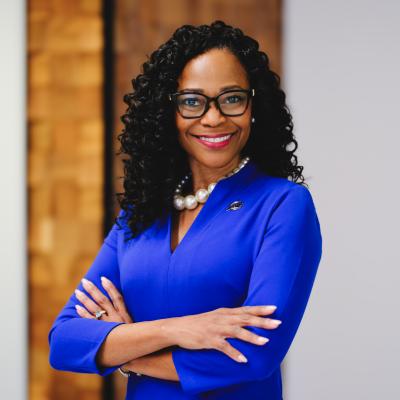About Us
Who We Are & What We Do
The Division of Broadband and Digital Opportunity was created within the N.C. Department of Information Technology in 2021 to elevate the state's priority to close the digital divide in North Carolina. The Broadband Infrastructure Office (established in 2015) partners with the Office of Digital Opportunity, established in 2021 as the first office of its kind in the nation, to serve as a statewide resource for broadband access and adoption initiatives.
The division's mission is to drive economic and workforce development by enabling all North Carolinians to fully participate in the digital economy through expanding access to high-speed internet, digital devices and digital literacy across the state.
Leadership

| Annette Taylor was appointed deputy secretary of Broadband and Digital Opportunity on March 7, 2025. She joined NCDIT in May 2022 as the director of the Office of Digital Opportunity, established as the first of its kind in the nation. As deputy secretary, she oversees the investment of nearly $1 billion in federal American Rescue Plan funds and $30 million in state funding for high-speed internet infrastructure access and adoption. |

| Angie Bailey was appointed director of the Broadband Infrastructure Office in December 2021. She served as interim director since August 2021 and was previously director of NC Broadband within the N.C. Department of Commerce. She has more than 20 years of experience in broadband planning and development in North Carolina, primarily at the state level. Angie was named N.C. Tech Association’s 2022 Tech Woman of the Year as part of the N.C. Tech Awards. |

| Maggie Woods was appointed director for the N.C. Department of Information Technology’s Office of Digital Opportunity in June 2025. She previously served as deputy director of the office, policy and program manager at the Institute for Emerging Issues, and director of the BAND-NC program. Throughout her career, Maggie has worked in many capacities in the nonprofit and public policy sectors, including directing international academic programs at Duke University, helping launch the virtual college advising program at College Advising Corps, and working at the International Labor Organization in Geneva, Switzerland. |
Supporting Community Connectivity
We specialize in helping communities build a 21st Century technology infrastructure that supports students, educators, first responders and businesses.
Broadband Adoption and Digital Literacy
The Office of Digital Opportunity actively pursues funding and collaborations to develop programs, policies, and tools to increase economic and workforce development. We work to ensure people have the skills and technology needed to compete for jobs. We also support and bring together organizations, programs and groups across the state to maximize the benefit of their efforts to close the digital divide.
Technical Assistance
The technical assistance program consists of an on-the-ground technical support team that can work with counties and communities across the state to provide broadband expertise. The team works closely with internet service providers to find creative solutions for serving areas where market forces aren’t working. Finally, it helps internet providers and communities seek out funding, including through North Carolina’s rural broadband grant program administered by our office.
FirstTech
The First Responder Emerging Tech (FirstTech) team collaborates directly with subject matter experts in fields such as networking, hardware, software, applications, and operating systems to identify challenges and risks that new technologies might pose, such as cybersecurity issues, connectivity needs, and interoperability within existing systems and emerging systems. The program will also identify other topics that can challenge or threaten an effective implementation of a new technology.
Policy Guidance
To help leadership develop local governance that promotes broadband expansion, we can advise broadband planning committees on policy changes to implement to eliminate barriers and obstacles to growth.
Mapping & Data Analysis
The Broadband Infrastructure Office works with communities to better understand their broadband infrastructure landscape so that they can plan for strategic growth. To do that, the office assists local communities to understand the data that they are gathering. That data can then be useful in identifying where infrastructure exists and where it doesn’t.
